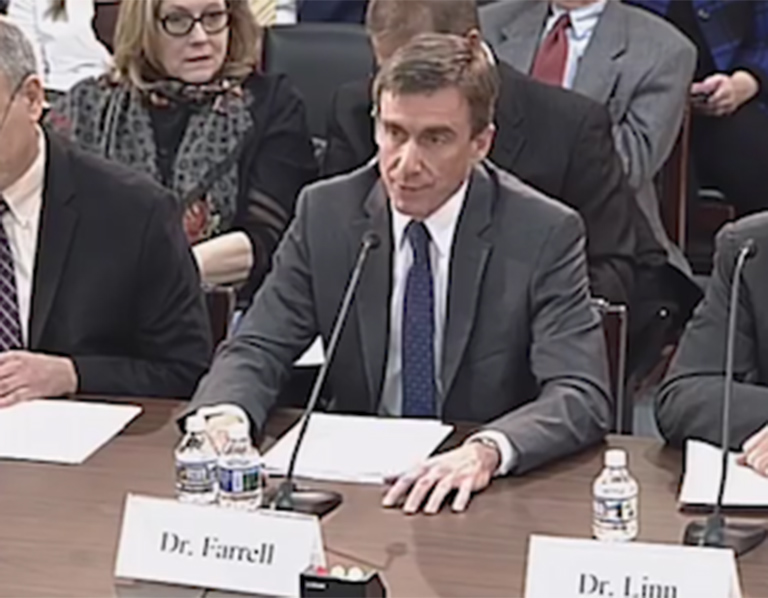NREL Briefs Congressional Committee on Impact of Scientific Innovations on Transportation Future

NREL Laboratory Program Manager for Vehicle Technologies John Farrell briefing the
U.S. House of Representatives Committee on Energy and Commerce.
Play Video
On March 7, John Farrell, NREL's Laboratory Program Manager for Vehicle Technologies, briefed the U.S. House of Representatives Committee on Energy and Commerce on how the Energy Department (DOE) and the national labs are driving innovation to spur advances in the efficiency and performance of fuels, vehicles, and the broader transportation system. Members of the Subcommittee on Environment requested an overview of research currently underway, likely changes in fuel and vehicle choices in the years ahead, and possible impact on consumers and the marketplace.
Farrell's testimony stressed the important role scientific research and engineering play in helping industry make breakthrough transportation options available to consumers and businesses, as well as in bridging the gap between existing and new technologies with efforts such as the multi-lab, multi-office Co-Optimization of Fuels & Engines (Co-Optima) initiative.
"While the impact of new technologies will indeed be wide-ranging, it is also true that vehicles with conventional internal combustion engines will remain an integral part of our transportation system for decades to come," said Farrell. "Our collaboration with other national labs and universities is helping fuel producers and engine makers put the most efficient and high-performance cars and trucks on the road in the near term, and could eventually save American consumers and commercial truck operators as much as $35 billion dollars per year in fuel expenses."
Farrell described how the lab's wide-ranging early-stage research provides industry with the scientific underpinnings needed to develop more convenient, affordable, and energy-efficient mobility solutions, eventually delivering benefits including cost savings, increased energy security, better air quality, and greater economic prosperity. He provided a snapshot of NREL's Sustainable Mobility Initiative, which is leading the way in exploring how vehicle automation and integration with the grid, the built environment, and the transportation network can reduce congestion while providing expanded travel alternatives and balancing electricity demands.
Farrell also gave committee members a look at NREL R&D focused on batteries, power electronics, and charging systems for electric vehicles, as well as related research on freight vehicles and fuel cell vehicles, and the data and analytical tools that support in-lab experimentation.
Farrell concluded that, "R&D is critical to our nation's transportation future. And as we contemplate the research portfolio needed to get us there, we can be assured that the global race for new technology solutions will only intensify. Maintaining our leadership in innovation is as important now as ever."
Other witnesses included representatives from the U.S. Energy Information Administration, Resources for the Future, Union of Concerned Scientists, and the Fuels Institute.
Learn more about NREL's sustainable transportation research.
Last Updated May 28, 2025
